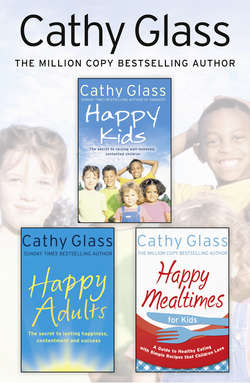Читать книгу Cathy Glass 3-Book Self-Help Collection - Cathy Glass, Cathy Glass - Страница 62
Dos and don’ts of parenting siblings
ОглавлениеHere are the golden rules for creating a positive environment in which all the children in the family feel valued. If each child feels recognised and valued as an individual (as an only child would feel), there will be less likelihood of resentment building and spilling out into anger, towards other siblings or the parents.
Don’t compare your children with each other. Comments such as ‘Tom always clears up his room/does his homework. Why don’t you, Claire?’ will build up resentment more quickly than anything.
Don’t label a child – ‘Tom has always been difficult/Claire’s very self-centred’: the label will stick.
Don’t give an older child too much responsibility for another child: both children will resent it.
Don’t have favourites or show favouritism, no matter how difficult one child is being.
Don’t tell your daughter you were hoping for a son, or vice versa.
Don’t make fun of a child in front of siblings or employ siblings to side with you when disciplining – ‘Isn’t Tom’s behaviour silly, Claire?’, won’t help your discipline, your relationship with Tom or Tom and Claire’s relationship with each other.
Don’t tell your children that their behaviour is uncontrollable, either individually or as a group, – ‘I don’t know what to do with you all!’ will seem to them like an achievement and engender more negative behaviour.
Do treat all children as individuals and equals; if you are prone to favouritism, keep a check on it.
Do spend one-to-one time with each child, as well as spending time with the children all together.
Do spend time each day playing with the children so that they can see you having fun with them. It doesn’t have to be long if you are over-stretched – a board game, painting or game of catch in the garden works wonders for team building.
Do eat dinner together at the table every evening.
Do listen to, talk to and discuss with each child individually as well as with the children altogether.
Do have regular family outings. They don’t have to be expensive – a trip to the park to feed the ducks with stale bread is just as valuable an experience as an expensive visit to a theme park.
They won’t all be good at everything, but all will be good at something.
Do guide and discipline your children, using the 3Rs, equally and fairly, all the time. If it’s not OK for Tom to slurp his drink at the table on Monday, Claire needs to be told about not slurping her drink when she does it on Wednesday. And if teenage Tom has to be in at nine o’clock and has £10 pocket money, so too does Claire.
